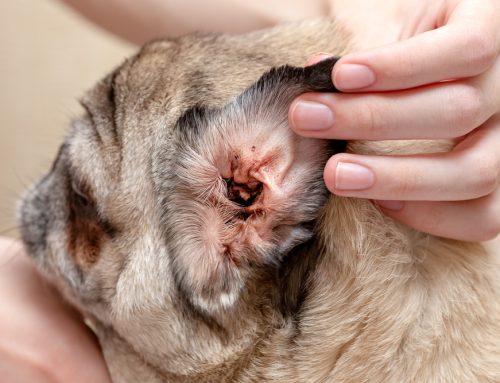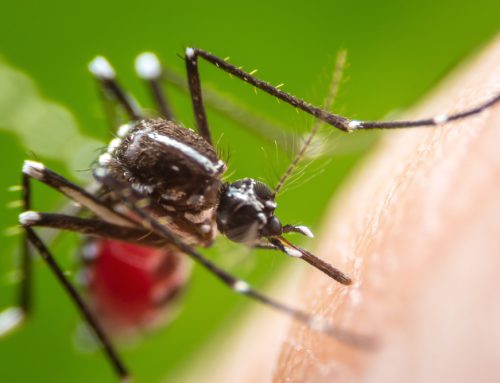Like people, pets can suffer from seasonal and environmental allergies, and may display similar signs. To help you better understand how allergies can affect your pet, our Countryside Veterinary Hospital team shares the travails of three pets who suffer from different allergy types. Learn how allergies can affect pets and how to keep your pet comfortable and itch-free.
Fido the foxhound and flea allergies
Fido is a handsome pup—fluffy, black coat, big bushy tail—a regular canine Casanova. He lives in a nice warm, humid area, and loves his daily walks in the woods with his owner. Lately, Fido’s owner had noticed him licking, scratching, and biting at himself, but he couldn’t see anything unusual about his dog’s coat. A few days later, however, Fido’s owner notices a red, irritated patch of skin near his pup’s tail, and knows it’s time to take him to the veterinarian. Fido’s veterinarian runs a fine-tooth comb through Fido’s hair coat, and the culprit is clear—Fido has fleas! She explains that fleas can be difficult to spot on pets with long, dark-colored coats, and that Fido was scratching because of an allergic reaction caused by flea saliva.
Flea allergy facts:
- Fleas love a warm, humid environment.
- Some pets are hypersensitive to the protein in flea saliva.
- Allergic reaction signs include intense scratching, hair loss, and red, irritated skin.
- Only a few flea bites can trigger an allergic reaction in highly sensitive pets.
- A year-round flea prevention protocol can keep pets flea- and itch-free.
- Fleas will also need to be eliminated from the pet’s environment, including their resting and sleeping areas in the house.
Franny the fluffy Cavalier King Charles spaniel and food allergies
Franny loves to eat—the oh-so-exciting sound of her owner pouring her kibble into her bowl is her favorite part of the day. Unfortunately, Franny has started scratching a lot, and her owner has become concerned that she may be allergic to her kibble, so she brings Franny to our veterinarian to discuss her dog’s signs. She tells the veterinarian about Franny scratching herself, and adds that she also has been getting frequent ear infections. Her owner wondered whether Franny’s problem could be an allergy to the corn in her kibble, but the veterinarian explained that, contrary to popular belief, this ingredient rarely causes an adverse reaction in pets.
Food allergy facts:
- An allergic reaction occurs when your pet’s immune system produces antibodies against some food ingredient—usually a protein.
- Most food allergies are caused by dairy products (e.g., eggs), and beef, lamb, and chicken.
- Food allergies can cause gastrointestinal issues, including gas, vomiting, and diarrhea.
- Your veterinarian will likely use a food trial to identify the offending ingredient, and then recommend a diet that does not contain that specific ingredient, but supports your pet’s nutritional needs.
Eddy the eager beagle’s environmental allergies
Eddy enjoys spending time outside, and can usually be found with his owner, strolling the neighborhood, going for hikes, or playing fetch in the park. But now that the weather is warmer, Eddy and his owner have started suffering from watery eyes and sneezing. Eddy’s owner has learned over the years that his dog begins exhibiting allergy signs in spring, so as soon as he saw that Eddy was sneezing, his eyes were watery, and his skin red, itchy, and inflamed, Eddy’s owner took him to the veterinarian. The veterinarian told him that Eddy had allergic dermatitis, which is seen commonly in pets, and caused by environmental allergens such as pollen, trees, grasses, mold, or dust mites.
Environmental allergy facts:

- Environmental allergies can be seasonal, but some pets have multiple allergens and suffer all year.
- Common seasonal allergy signs include red, irritated skin, hair loss from scratching and chewing, skin infections, chronic ear infections, anal gland issues, paw licking, face rubbing, and sneezing.
- Allergies tend to worsen with age, as the pet is repeatedly exposed to allergens.
- Your veterinarian may recommend an antihistamine or over-the-counter allergy medication to treat mild allergic reactions and itching.
Yes, allergies can be miserable for people and their pets, but fortunately for Fido, Franny, and Eddy, pet allergies can be treated. Treatments include:
- Corticosteroids
- Topical ointments
- Medicated shampoos
- Antibiotics
- Anti-itch medications
- Prescription food-allergy diets
If you suspect your pet is suffering from allergies, contact Countryside Veterinary Hospital. We can pinpoint your pet’s allergens with blood tests, food trials, or intradermal testing, and provide treatment to soothe your pet’s symptoms.








Leave A Comment